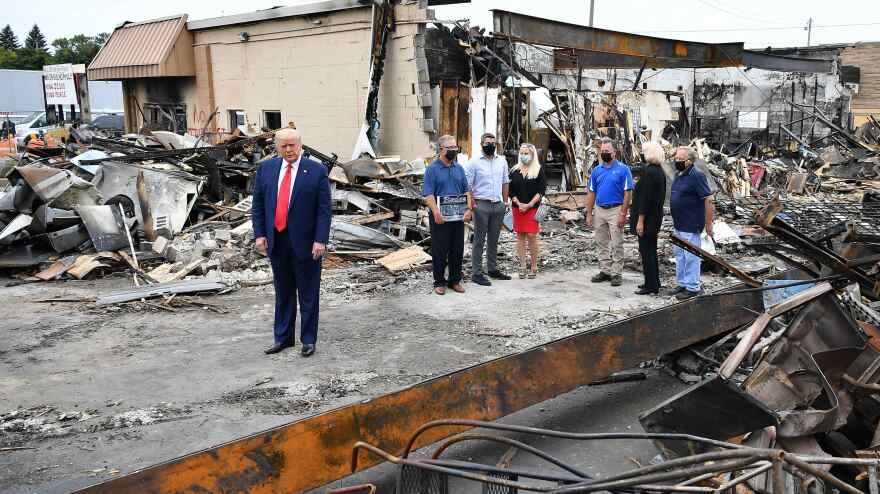President Trump is making crime a key issue in his reelection campaign, but criminologists worry he and the administration are more interested in using it for political advantage.
Trump's public statements about violence and the actions of his administration in response to this summer's demonstrations don't represent efforts likely to produce a meaningful long-term reduction in crime across the United States, specialists said.
One example is the Justice Department's decision to send federal agents to cities around the country to try to tamp down unrest and try to crack down on gun violence in swing states.
"From the criminological point of view, it's just mind-blowing to think that a couple of hundred folks who are not trained and who are unfamiliar with the area are going to help out very much," said Richard Rosenfeld, a criminologist at the University of Missouri, St. Louis.
Rosenfeld said an increase in the numbers of homicides and aggravated assaults this year should trouble people, but also that there aren't enough data to link those problems to protests over police violence.
Trump has sought to focus attention on what he calls anarchy in cities where there have been demonstrations following well-publicized violence by police against Black citizens.
Situation in Kenosha
This week, the president inserted himself into the latest situation in Kenosha, Wis., where the Democratic mayor had asked him not to visit because his city is still recovering from violence that burned down buildings and shuttered small businesses. The president traveled there anyway.
"Kenosha's been ravaged by anti-police and anti-American riots," Trump said.
Demonstrations erupted after a white police officer fired seven shots into the back of a Black man named Jacob Blake. Then, a white teenage suspect who reportedly supports the president was charged with six criminal counts, including first-degree intentional homicide, in connection with a shooting that left two protesters dead and a third injured. Trump defended the teen, explaining he might have acted in self-defense.
During the visit Tuesday, Trump offered praise for Republican elected officials in Wisconsin, a battleground state. And he went out of his way to attack Democrats in other nearby big cities.
"Obviously that's been a disaster, Chicago, total disaster," Trump said. "With again, radical left Democrat, it's all Democrat, everything is Democrat, all of these problems are Democrat cities. We don't want to say it, but it is."
At the president's side was Attorney General William Barr. His Justice Department said it's investigating whether the police officer who shot Blake broke civil rights laws. Barr promised the officer would get due process.
Then he addressed the social unrest.
"Once again, we saw the hijacking of a protest by a hard-core group of radicals who were carrying out, planning, a coordinated, violent attack on law enforcement, on public property and on private property, and that can't be tolerated," Barr said.
Barr has pointed to so-called radicals as a source of anarchy at protests across the country. Yet that isn't borne out in the criminal charges that federal prosecutors have brought to date.
Trump's Democratic opponent, Joe Biden, cried foul in a speech Monday.
"Donald Trump looks at this violence, and he sees a political lifeline," Biden said.
For its part, Trump's Justice Department said it's taking steps to maintain order. It has sent federal agents to nine cities led by Democrats where violent crime has spiked this year. But it hasn't moved that program, called Operation Legend, into places such as Tulsa, Okla., which is run by a Republican mayor.
This week, in advance of the Kenosha trip, and as the election approaches, the Justice Department began promoting that program by highlighting one Operation Legend case every day in its press releases.
The Justice Department's second effort is a surge of agents to cities facing riots. Some mayors and governors have refused the officers, and critics said many of the agents had no training for dealing with protesters.
"It's in particular federal agents who are not trained in local policing, who have no knowledge of the local area," said Rosenfeld of the University of Missouri, St. Louis.
Tackling crime, he said, requires good policing, the kind where officers get out of their cars and listen to community members, face to face. That's been difficult during the pandemic.
"And we have to subdue the virus in order to increase police effectiveness and effectively confront this rise in violent crime," Rosenfeld said.
Experts said they know what it takes to reduce crime and restore trust in police, but it takes political will to get that done.
"We need to commit ourselves to the nonpartisan, nonideological, evidence-based solutions that have been proven over the last 20 years to reduce violence," said Thomas Abt, a senior fellow at the Council on Criminal Justice, who made clear he was speaking for himself and not the organization.
That means, Abt said, focusing on the highest-risk people and places; understanding that enforcement is part of the solution but not the only part; and "now more than ever, we see that the criminal justice system and police in particular must be perceived as fair if they're going to be effective."
Copyright 2023 NPR. To see more, visit https://www.npr.org.







